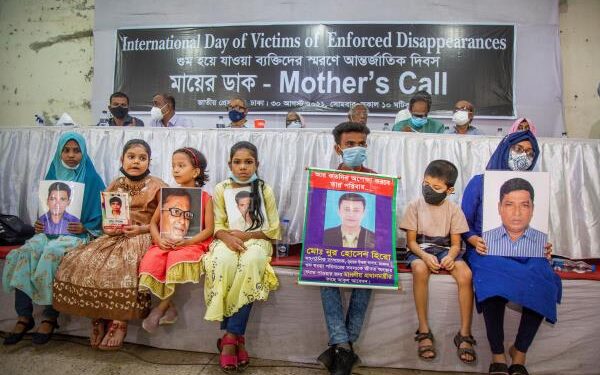By Janet Sankale
The United Nations has been urged to investigate enforced disappearances in Bangladesh and other parts of the world, and hold perpetrators to account.
In a joint statement to mark the International Day of the Victims of Enforced Disappearances on August 30, 2021, the Asian Federation Against Involuntary Disappearances (AFAD), Mayer Daak, and Odhikar expressed concern that enforced disappearances and other grave human rights violations had become a systematic tool to suppress political opponents and silence dissenting voices.
They noted that this was not a new phenomenon in Bangladesh and expressed concern that it had escalated with growing Covid-19 pandemic, with dissenting voices that are critical of the government’s preventive policies and actions being targeted.
“Impunity prevails in the country due to the absence of an accountable government and rule of law, lack of independence of the judiciary and corruption and lack of transparency and accountability in the state institutions. Bangladesh has never had an effective mechanism to combat impunity and establish justice,” said the statement.
The United Nations General Assembly on December 21, 2010 declared the International Day of the Victims of Enforced Disappearances to raise awareness about the suffering of people who are arrested, detained, or abducted against their will by governments that refuse to disclose their whereabouts.
The Asian Federation Against Involuntary Disappearances is a federation of human rights organisations directly involved in the issue of enforced disappearances in the region. Mayer Daak (“Mother’s Call”) is a platform of the families of victims of enforced disappearances in Bangladesh. Members’ common goal is to find the whereabouts of their loved ones and advocate justice for the victims. Dhaka-based Odhikar was established in 1994 to monitor human rights violations and create wider awareness in Dhaka.
The three organisations paid tribute to victims of enforced disappearances and declared that they stood in solidarity with their families and relatives in Bangladesh and other parts of the world.
They asked the government of Bangladesh to return all disappeared persons to their families and ensure justice for the victims.
The statement said some of the disappeared persons have been reported to resurface in the custody of law enforcement agencies arrested under the Digital Security Act, a law enacted in 2018 that grants law enforcers the power to arrest anyone accused of transmitting any “defamatory information” online which “destroys communal harmony” or “creates unrest or disorder” or “hurts religious sentiments or value”.
The organisations added that despite credible information and evidence, the Bangladeshi authorities have denied committing enforced disappearance and ignored calls by the United Nations, national and international human rights organisations, and civil society organisations to end the culture of impunity among law enforcement and security forces.
According to data from Odhikar, 603 persons have been subjected to enforced disappearances between January 2009 and June 2021. Some 153 persons are still missing, 81 bodies have been recovered, and 369 persons have been returned alive after several days, months, or years.
Odhikar has also documented 16 cases of enforced disappearance from January to June 2021, most of the victims being political activists belonging to the opposition and other dissidents, including academics and journalists disappeared by the Rapid Action Battalion and the Detective Branch of the police.
In a press release dated May 25, 2021, the International Federation for Human Rights (FIDH) acknowledged that enforced disappearance was a global problem and a serious violation of human rights enshrined in the International Covenant on Civil and Political Rights and the United Nations Convention against Torture, to which Bangladesh is a party. It is also considered a crime against humanity and prohibited under international law.
According to the statement, Bangladesh also failed to implement Universal Periodic Review (UPR) recommendations to conduct thorough investigations into cases of enforced disappearance and to ensure that the perpetrators are brought to justice.
The UPR is a state-driven process, under the auspices of the Human Rights Council, which provides the opportunity for each country to declare what actions it has taken to improve the human rights situation in its territory and fulfil its human rights obligations.
According to the statement, the government has, since 2013, failed to respond to letters demanding information on the fate and whereabouts of several disappeared persons sent by the Working Group on Enforced or Involuntary Disappearances
Human rights defenders and victims’ families have expressed concern about the deteriorating rights situation and shrinking space for dissent in the country and urged the United Nations Human Rights Council to hold law enforcement and security forces accountable in efforts to stop grave violations.
They also asked the council to lobby the government of Bangladesh to ratify the International Convention for the Protection of all Persons from Enforced Disappearance and enact domestic laws criminalising enforced disappearances.







